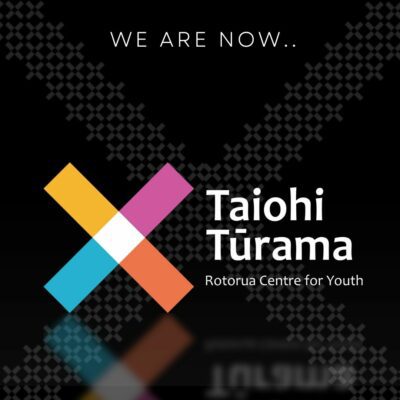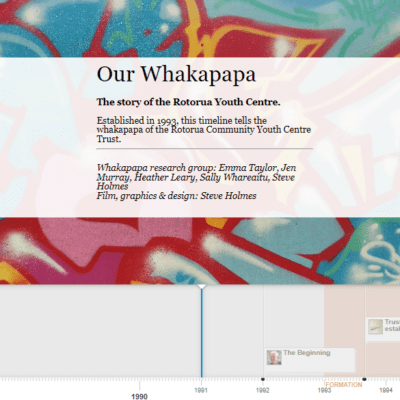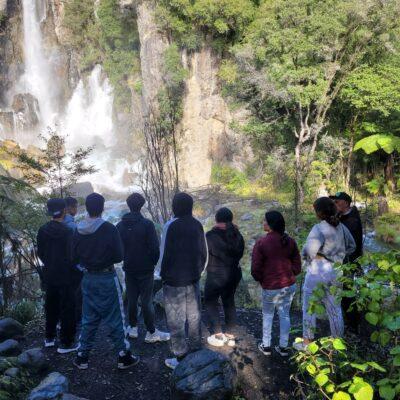We have worked with 110 ākonga who are disengaged or disengaging from education, with consistently keeping more than 80% of participants engaged and attending

A highly successful programme desired to support the re-engagement of ākonga in education or transition them on to further learning or employment has sadly come to an end this December due to a refocus in the funding from the Ministry of Youth Development.
Te Hiringa is developed with a youth centric, holistic framework which includes Outdoor experiential programming, aspirational PATH planning, Creative Youth Development, Education and Employment Pathway exploration, Employability Skill development, Alcohol & Other Drugs education, emotional wellbeing and regulation and more. We believe this holistic combination to be effective.
We consider the majority of the Ākonga who come off the Te Hiringa programme to be remarkable successes. Every one of them initially show reservations towards the programme and the other young people. Many lack confidence, social and communication skills, and during the first few weeks of the programme these young barely speak, express little to no interest in the activities and present multiple challenges to the youth workers.
Over the course of the programme, the young people became more and more comfortable with staff, and began to open up. From here conversations about life and future pathways begin and strategies are put in place. Ākonga eventually become very active within the programme, showing enthusiasm and interest in all activities, and many even take on leadership roles, encouraging the other Ākonga to participate.
Overall, the Ākonga who complete this programme are completely different people than when they began! Self-confidence, communication and social skills increase to the point where even public speaking is possible.
Social & community connection has always been a strong development area for Ākonga over the Te Hiringa programme. Many Ākonga have been previously isolated and/or only connected within specific subcultures. The Te Hiringa programme is extremely successful in facilitating the forming of strong bonds between Ākonga. As previously reported, we have in many cases seen Te Hiringa successfully unite young people who represented two different gangs. In some cases, these bonds were so strong that these friendships gained some negative attention outside of the programme which was worked through with the ākonga.
Self-expression also developed greatly for these Ākonga, perhaps best seen through their engagement in some of the creative programmes. Using creative mediums to build resilience, teach practical skills to help rangatahi to help themselves, help rangatahi to discover who they are, their gifts and abilities, have healthy relationships (all kinds including with whānau and friends) based on respect, negotiation and consent, and identify inappropriate behaviour. Individual projects have explored significant issues such as the effects and causes of crime. This increased self-expression is also evident through the outdoor activities as they dive deeper into Te Arawa History, and their own whakapapa. Vital for their identity, ākonga were able to breathe and stand in the places where their Tupuna once stood and lived. The historical information showcased how necessary it was to be thinking of the future and how to be self-sustaining, both in a physical sense and mentally.
Achievement for many Ākonga, the Te Hiringa programme provides the opportunity to achieve, perhaps for the very first time. Many Ākonga have never experienced the feeling of achievement through schooling and home life. The tears witnessed as our Ākonga are handed the very first certificate they have ever received at the graduation says it all!
Resilience is grown through youth development activity and supported through one-on-one mentoring. Many of the activities within the Te Hiringa programme push young people beyond previous limitations and encourage determination. Purpose, hope, and connection are key ingredients of resilience. Through exploration of identity, development of strengths and skills, we have strengthened purpose. Through goal setting and delivering personal experiences of success and achievement we have imparted hope. And the supportive and trusted relationships have built positive connection.
In the face of a successful model and an intense collaborative effort which has proven success in engaging the most disenfranchised and disadvantaged youth, the end of the current Ākonga and the RFP for much less intensive work is disappointing to say the least. We believe that this intensive work is critical in giving these Ākonga a second chance at success in life and that the new request for proposal shows a significant lack of value for disengaged youth. As there will be no funding for Te Hiringa this programme will now cease. By this time, we will have worked with 110 ākonga who are disengaged or disengaging from education, with consistently keeping more than 80% of participants engaged and attending the programme when they had disengaged from the education system; and re-engaging 63% of the participants (who complete the programme) into education, training or employment, it’s fair to say that we have exceeded expectations.
The success of Te Hiringa has led to schools wanting to approach the issue of disengaging ākonga differently. A recent meeting with two of the main Rotorua High Schools resulted in a new collaborative pathway model (that schools were eager for) where students showing signs of disengaging would engage in the programme while still being enrolled in the school who would keep the door open for the Ākonga to return. This is exactly the preventative space where we believe Te Hiringa belongs, preventing disengagement. However, sadly the Ākonga contract and funding will end resulting in this model not being able to be piloted. These kura have expressed a high level of disappointment that Te Hiringa will no longer be on offer.




Comments (0)